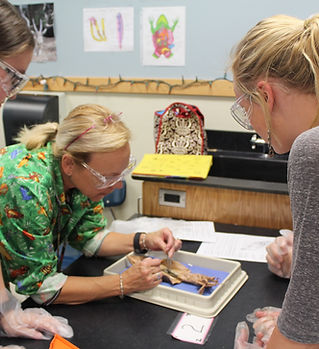BIOLOGY
SCQF LEVEL 5 - National 5
This course has 3 units:
Unit 1: Cell Biology
The key areas covered are: cell structure; transport across cell membranes; DNA and the production of proteins; proteins; genetic engineering; respiration.
Unit 2: Multicellular Organisms
The key areas covered are: producing new cells; control and communication; reproduction; variation and inheritance; transport systems in plants and animals; absorption of materials.
Unit 3: Life on Earth
The key areas covered are: ecosystems; distribution of organisms; photosynthesis; energy in ecosystems; food production; evolution of species.
QUALIFICATION
National 5
DURATION
1 Year full time/
5 periods per week
COURSEWORK
Assignment (20% of final grade)
Plan, carry out and write-up an experiment (8 hours in total)
EXAM
2 hours and 30 minutes
(Multiple choice and short answer questions)
COST
Contribution to trips – approx. £4
TEACHERS
Various
WHY TAKE THIS COURSE?
wHAT WILL YOU EXPERIENCE?
Anyone with an interest in the living world should consider N5 Biology. As well as finding out about what’s going on inside our cells, you will learn about the workings of animals and plants as well as the environment around us.
In class you will participate in a range of learning activities, individually and in groups. There will be an emphasis on the application of knowledge and the development of problem-solving skills. Practical work will form an important part of the learning experience.
There is an annual field trip to Bennachie in June every year.
KEY FACTS
Everything you need to know before selecting this course
entry requirements
It would be useful if you had already achieved National 4 Biology OR had studied Chemistry or Physics at N5.
This course may be suitable for pupils that are studying Biology for the first time.
what will you get?
This course is graded A-D
The opportunities provided by this course will develop your: -
-
understanding of the living world in an engaging and enjoyable way.
-
analytical thinking skills.
-
ability to make reasoned evaluations.
-
ability to evaluate biological issues, assess risk, make informed decisions and develop an ethical view of complex issues.
-
communication, collaborative working and leadership skills.
-
ability to apply critical thinking in new and unfamiliar contexts to solve problems.
progress
Everything you need to know about future pathways from this course
EMPLOYMENT
The knowledge and skills you learn in Biology are directly applicable to further studies and careers in agriculture, forestry, the food and drinks industry, forensics, life sciences and health care.
my world of work
This link will take you to an excellent resource on MyWOW which looks at potential career routes when you select a combination of subjects.
STUDENT STORIES
Information from pupils who have studied this course as to how they feel it was.
Douglas - S4
I chose Biology as I enjoyed learning some Biology at home and was wanted to find out more. I have enjoyed the Cells unit the most. Although it was still interesting, I wasn’t so keen on the Environmental unit.
If you are interested in finding out about what is going on inside our bodies as well as the environment, you should pick N5 Biology.

Jack - S5
I picked Biology because I am interested in human Biology and thought that the course would be mainly about our bodies. I’m not so interested in Environmental Biology so haven’t enjoyed that unit so much. Some of the Maths questions in Biology involve more working out than I was expecting.
I would recommend that pupils choose N5 Biology because it’s good to learn about how your body operates.

Laura - S5
I found the topics covered in Nat 5 very interesting and easy to learn so I decided to take Higher Biology this year. I also found the Nat 5 exam easy overall which gave me incentive to take it again in fifth year. I have no regrets after taking Nat 5 biology because it has set me in good stead for being on track to hopefully getting a good grade at higher. I would also like to enter the health care sector when I'm older, so having a science at higher level would be very useful to me.
My teacher taught the subject well and clearly, therefore everything was super easy to understand.
I loved the human body section of the course and I think there should be more of this topic added to the course as it was very interesting. Overall, it was easy to learn and study for. My whole class and I enjoyed it very much, especially the hands-on activities like looking at real lungs and hearts.
I would recommend this course to pupils who find learning definitions relatively simple and who are methodical as the content is based quite a lot on the learning of terms and processes especially.
